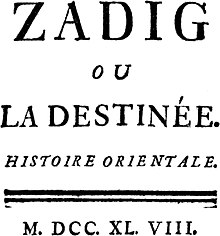This article needs additional citations for verification. (September 2018) |
 | |
| Author | Voltaire |
|---|---|
| Original title | Zadig ou la Destinée |
| Language | French |
| Genre | Philosophical novella |
| Published | 1747 |
| Publication place | France |
| Media type | |
Zadig; or, The Book of Fate (French: Zadig ou la Destinée; 1747) is a novella and work of philosophical fiction by the Enlightenment writer Voltaire. It tells the story of Zadig, a Zoroastrian philosopher in ancient Babylonia. The story of Zadig is a fictional story. Voltaire does not attempt any historical accuracy. The singular narrative and unique journey of Zadig still stands as a philosophical reference to “nothing is either good or bad without the comparison of one with the other.”
It was originally published as Memnon in Amsterdam (with a false imprint of London given) and first issued under its more familiar title in 1748.[1]
The book makes use of the Persian tale The Three Princes of Serendip. It is philosophical in nature, and presents human life as in the hands of a destiny beyond human control. Voltaire challenges religious and metaphysical orthodoxy with his presentation of the moral revolution taking place in Zadig himself. Zadig is one of Voltaire's most celebrated works after Candide. Many literary critics have praised Voltaire's use of contradiction and juxtaposition.[2]
The protagonist's name is derived from the Hebrew term tzadik, a title bestowed in Judaism on a particularly righteous person – though Voltaire's character is not presented as a Jew and does not exactly fit the criteria set in Jewish tradition for use of the term.[3]
- ^ The first edition from Lyon of Zadig
- ^ Aritry Das. „Zadig Arabian Nights and Murders in the Rue Morgue: Journey of the Detective“
- ^ Fox, Margalit (2018). Conan Doyle for the defense : the true story of a sensational British murder, a quest for justice, and the world's most famous detective writer. New York: Penguin Random House. ISBN 978-0-399-58945-4. OCLC 1030445407.